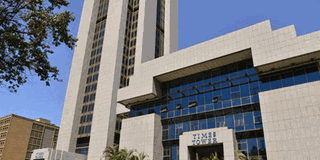Fears of smuggling boom as KRA starts collecting higher excise stamp charges

Times Tower, Kenya Revenue Authority headquarters in Nairobi.
The steep gap between excise stamp duty charged in Kenya and its East African Community (EAC) neighbours has once again put the Kenya Revenue Authority (KRA) in the spotlight amid fears of a boom in illicit trade following the latest increase of the rates.
Kenya last week gazetted new excise stamp fees on 14 categories of excisable goods in a move that has further widened the gap between stamp duties paid by manufacturers and importers in Kenya and those paid in Tanzania, Uganda, and Rwanda.
The National Treasury raised the stamp duty on beer from Sh1.50 to Sh3, while the charges on spirits have been increased to Sh5 from Sh2.80, that on juice has been set at Sh2.2 from Sh0.6, duty on cosmetics has been raised to Sh2.5 from Sh0.6 while that on tobacco is now Sh5 from Sh2.8.
In comparison, businesses in Tanzania pay a stamp duty of between Sh0.96 and Sh1.21 on beer, Sh2.21 on spirits, Sh1.26 on juices, Sh2.21 on tobacco, and none on bottled water and cosmetics.
In Uganda, businesses pay a stamp fee of Sh1.16 for beer, Sh3.55 for spirits, Sh0.68 for juices, Sh3.55 for tobacco, and none for bottled water and cosmetics. Meanwhile, Rwanda does not charge stamp duty except on tobacco, which is charged a duty of Sh1.30.
Interestingly, these Electronic Goods Management System (EGMS) stamps are managed by the same company – Swiss firm Security Solutions SA (SICPA) – in all four countries despite the vast difference in the stamp costs.
SICPA installs hardware and software equipment at manufacturers’ premises for the management of the track and trace system aimed at elbowing out counterfeit goods from the market.
Manufacturers have, however, warned that the rise in stamp duty will lead to a boom in the illicit trade of these goods as traders will smuggle the cheaper-priced products from Kenya’s neighbours to sell in the country.
The Kenya Association of Manufacturers (KAM) last Thursday said the increased EGMS stamp fees up are beyond the current market costs of producing the stamps and shall have a detrimental effect on consumers and manufacturers due to increased cost of production and finished products.
The stamp duty increment comes barely five months after the Treasury effected a 6.3 per cent inflation adjustment on specific excise tax rates was effected on October 1, 2022, impacting cosmetics, confectionary, alcoholic and non-alcoholic beverages, including bottled water, and tobacco and nicotine products.
The inflation adjustment also came just three months after the exchequer had increased excise taxes by between 10 per cent and 20 per cent through the Finance Act, 2022 that took effect on July 1, 2022.
“We are concerned that this increment to some of the most counterfeited items in Kenya will further encourage the counterfeit and illicit trade. This will deny government revenue and put the lives of Kenyans at risk as substandard and highly dangerous goods infiltrate the market,” said KAM chairman Rajan Shar.
Excise duty is the third largest tax collected by KRA and is poised to play a major role in achieving President William Ruto’s plan to raise revenue collection and cut the budget deficit.
The KRA targets to collect Sh297.2 billion from excise duty by June and to increase this to Sh521.5 billion in 2027.
A survey conducted by the Anti-Counterfeit Authority (ACA) on some 16 sectors of the economy showed that illicit trade in these sectors grew to Sh586.17 billion in 2018 from Sh519.92 billion in 2017, a growth of 12.74 per cent.
The survey showed that the value of smuggled alcohol hit Sh9.69 billion, that of tobacco was Sh2.35 billion, and that of cosmetics and perfumes was Sh710 million dealing a blow to local manufacturers who are paying higher excise taxes.
The taxman reckons illicit trade is denying it billions of shillings in revenue each year, but the higher excise stamp duty and the recent increases in excise duty are set to give further incentive for smugglers to smuggle cheap tobacco, alcohol, and other goods through Kenya’s porous borders.
This is even as fake stamps have been a thorny issue for KRA for many years, with President Ruto particularly irked by the small number of excise stamps sold by KRA in proportion to the economy compared to its neighbours.
“Part of our revenue gets lost because we have more fake stamps than genuine stamps on our manufactured goods, how is that possible? We have to sort that out because we are losing revenue,” said President Ruto last October.
Manufacturers have lamented that the Treasury ignored their input on the gazetted Excise Duty (Excisable Goods Management System) (Amendment) Regulations, 2023 during the public participation stage and that the gazette regulations are the same as the draft regulations that were subjected to public scrutiny.
“We are disappointed by this move as it is not reflective of industry views, which were submitted to the government during the stakeholder engagement process.
“The potential implications of increasing the cost of tax stamps for tobacco and nicotine products include exerting additional pressure on consumers who are already stretched by the rising cost of living and widening the differential between legitimate tax-paid products locally and in the EAC,” said BAT Kenya managing director Crispin Achola.
Industrialists and traders have now steeped a push for the implementation of a new tax policy following three rounds of unforeseen tax raises by the National Treasury in one and a half years.




